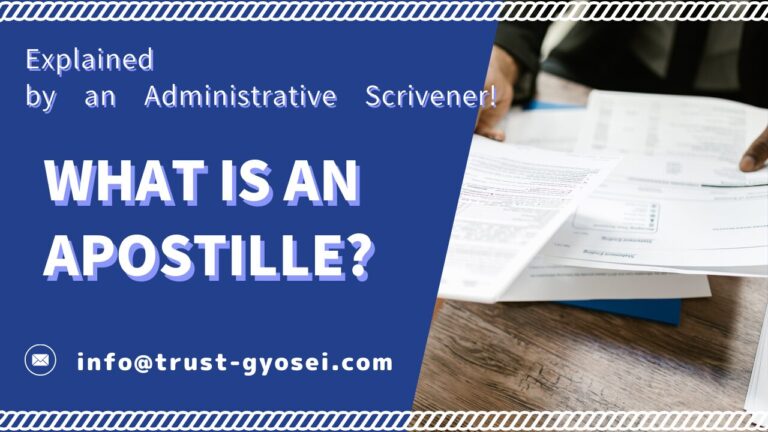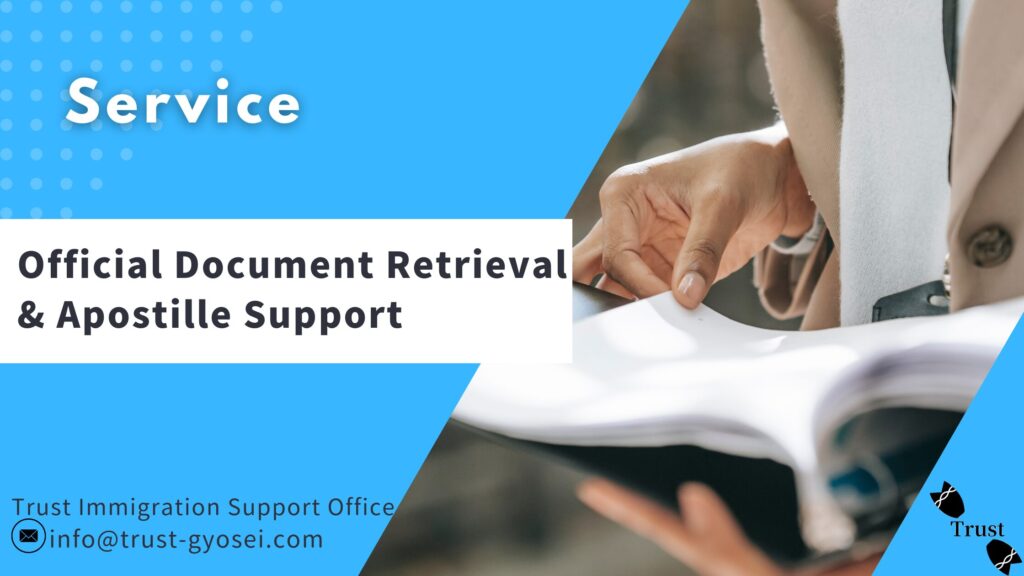When submitting official Japanese documents to a foreign government or organization, you may be asked to provide an “Apostille.” This certification proves that the document is a legitimate public document issued by an official Japanese authority.
Whether you’re getting married abroad, applying for a visa, purchasing property, or starting a business overseas, the Apostille plays a vital role in the international recognition of Japanese documents. In this article, we will explain what an Apostille is, how it differs from other types of authentication like Official Seal Verification and Consular Legalization, and how to apply for one.

1. What Is an Apostille?
An Apostille is a type of certification issued by Japan’s Ministry of Foreign Affairs (MOFA) that validates the authenticity of a public document, confirming that it was issued by a recognized Japanese authority. It is based on the Hague Convention of 5 October 1961 Abolishing the Requirement of Legalization for Foreign Public Documents—commonly known as the Hague Apostille Convention.
This certification allows documents to be submitted directly to authorities in other member countries of the convention, without requiring additional legalization from the embassy or consulate of the destination country.
Apostille vs. Official Seal Verification vs. Consular Legalization
Understanding the differences between these three types of certifications is essential:
-
Apostille: Issued by MOFA and valid only for countries that are parties to the Hague Convention. No further consular legalization is needed.
-
Official Seal Verification: Also issued by MOFA, this certifies the official seal on a Japanese public document. It is required when the destination country is not a Hague Convention member.
-
Consular Legalization: Performed by the embassy or consulate of the receiving country. It is often required after Official Seal Verification, especially for countries not part of the Hague Convention.
Important Note:
Even if a country is a Hague Convention member, some authorities may still request consular legalization. Always check the specific requirements of the receiving institution before proceeding.
2. When Is an Apostille Required?
Apostilles are commonly required in the following scenarios:
-
A Japanese company opening a new branch overseas or investing in a local business may need to submit corporate registration documents with an Apostille.
-
Individuals applying for a work visa abroad might be instructed by a local law firm to provide personal documents, like a certificate of residence or tax payment certificate, with an Apostille.
-
Foreign nationals marrying a Japanese citizen may be asked to provide an Apostille with relevant documents such as a family register (koseki tohon).
In short, whenever a Japanese public document must be recognized abroad—especially in countries that are signatories to the Hague Apostille Convention—an Apostille may be necessary.
3. What Documents Are Eligible for an Apostille?
To qualify for an Apostille, a document must meet the following three criteria:
-
It includes the date of issuance (must be within the last three months).
-
It identifies the issuing authority (name and position of the official or institution).
-
It bears an official government seal, not just a private signature or stamp.
Common Documents That Require Apostilles:
-
Certificate of residence
-
Family register (koseki)
-
Birth or marriage certificates
-
Corporate registration documents
-
Tax certificates
If you’re submitting a private document (such as a contract), you must first have it notarized by a public notary. Only then can the notarized version be certified with an Apostille.
4. When Is an Apostille Not Enough?
For countries not part of the Hague Convention, you cannot use an Apostille. In these cases, the proper procedure is:
-
Obtain Official Seal Verification from MOFA.
-
Then apply for Consular Legalization at the relevant embassy or consulate of the destination country.
Also, even in some Hague member countries, the local authority might request consular legalization due to internal policies. Be sure to verify with the recipient organization before applying.
Additionally, once a document has received Official Seal Verification from MOFA, it cannot be re-certified by a Japanese embassy or consulate abroad. Therefore, it’s crucial to confirm where the certification must come from before beginning the process.
Need Help with Apostille Procedures?
At Trust Administrative Scrivener Office, we provide complete support for clients who need official Japanese documents certified for international use. From obtaining public records like family registers or tax certificates to applying for Apostilles and Official Seal Verifications, we take care of the process on your behalf.
If you’re unsure what kind of certification is required or how to navigate the procedures, don’t hesitate to reach out. We are here to assist you every step of the way.
For more details, click here.
Contact Us
Office Name: Trust Administrative Scrivener Office
Administrative Scrivener: Keiko Utsunomiya
Email: info@trust-gyosei.com











